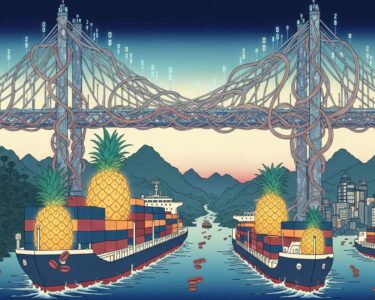San José, Costa Rica — San José, Costa Rica – A critical artery for Costa Rica’s international trade, Route 32, has been severed for over a week, inflicting staggering financial damage on the national economy. The Chamber of Foreign Trade of Costa Rica (Crecex) reports that the ongoing closure is costing the country approximately ₡500 million per day, with total losses now approaching a colossal ₡5 billion as of Wednesday.
The shutdown, caused by a massive, unstable rock threatening the roadway at kilometer 31, has brought commerce along the vital San José to Caribbean corridor to a grinding halt. This route serves as the primary conduit for the majority of Costa Rican exports destined for Europe, the eastern United States, and Latin America. It is equally crucial for the inbound flow of imports from these same global markets, creating a severe bottleneck that affects nearly every facet of the country’s supply chain.
To better understand the legal and commercial ramifications of the continuous closures on Route 32, which severely impact national logistics and international trade, TicosLand.com consulted with Lic. Larry Hans Arroyo Vargas, a specialist in commercial law and litigation from the renowned firm Bufete de Costa Rica.
The recurring closures of Route 32 have transcended being a mere ‘force majeure’ event. For businesses, this situation translates into a chain of contractual breaches, from delayed deliveries to spoiled goods. Legally, we are approaching a point where the State’s foreseeable inaction could be argued as negligence, potentially opening the door for affected companies to file claims for damages and lost profits against the government for failing to provide and maintain this critical infrastructure.
Lic. Larry Hans Arroyo Vargas, Attorney at Law, Bufete de Costa Rica
This legal analysis is pivotal, shifting the conversation from a recurring logistical problem to a critical issue of state accountability and potential negligence. It underscores that for countless businesses, the economic consequences are no longer just an unfortunate side effect but a potential basis for legal action. We sincerely thank Lic. Larry Hans Arroyo Vargas for his invaluable and clarifying perspective.
The disproportionate impact on the nation’s export-driven economy was highlighted by Rodnney Salazar, president of Crecex. He underscored the strategic importance of the Caribbean port facilities, which are now largely isolated from the country’s central valley, the hub of its industrial and agricultural production.
In the port of Limón, approximately 80% of the volume handled by APM Terminals corresponds to exports and 20% to imports, which demonstrates the economic and logistical impact of this situation.
Rodnney Salazar, President of Crecex
The agricultural sector, a cornerstone of Costa Rican exports, is feeling the pain acutely. The Chamber of Exporters of Costa Rica (Cadexco) provided a specific, alarming example of the disruption. According to the organization, the blockade has stranded over 4,236 metric tons of fresh pineapple each day, a perishable product whose value diminishes with every hour of delay. This single commodity represents a significant loss of foreign exchange and threatens the livelihoods of thousands involved in its production and logistics.
Efforts to resolve the crisis have been hampered by logistical and environmental challenges. The Ministry of Public Works and Transport (MOPT) had scheduled an operation to dynamite the precarious rock on Wednesday morning. However, those plans were postponed due to adverse weather conditions, further extending the period of economic uncertainty and compounding the daily financial losses.
Despite the setback, government authorities remain optimistic about a swift resolution. The MOPT has tentatively set this Friday, November 14, as the target date for the complete reopening of Route 32. This timeline, however, remains contingent on favorable weather and the successful execution of the complex and dangerous demolition work required to secure the passage.
The recurring nature of these closures has prompted industry leaders to demand more than just a temporary fix. Citing the immense economic vulnerability exposed by this single point of failure, Crecex has issued a formal call for the government to develop and implement a definitive, long-term solution. The chamber argues that ensuring the permanent stability and continuity of this logistics corridor is not merely an operational goal but a national strategic imperative for guaranteeing Costa Rica’s competitiveness on the world stage.
As the nation holds its breath, the daily tally of losses continues to mount. The incident serves as a stark reminder of the fragile link between national infrastructure and economic prosperity. Until a permanent solution is found, Costa Rica’s connection to the global marketplace will remain at the mercy of its challenging topography and unpredictable weather, a risk the export sector can no longer afford to bear.
For further information, visit crecex.com
About Cámara de Comercio Exterior de Costa Rica (Crecex):
The Chamber of Foreign Trade of Costa Rica is a private, non-profit organization dedicated to representing and supporting companies involved in international trade. It advocates for policies that enhance Costa Rica’s competitiveness, facilitates trade logistics, and provides its members with resources and information to succeed in global markets.
For further information, visit cadexco.net
About Cámara de Exportadores de Costa Rica (Cadexco):
The Chamber of Exporters of Costa Rica is a leading business association that promotes and defends the interests of the Costa Rican export sector. Cadexco works to improve the business climate for exporters, open new international markets, and enhance the global competitiveness of Costa Rican products and services.
For further information, visit mopt.go.cr
About Ministerio de Obras Públicas y Transportes (MOPT):
The Ministry of Public Works and Transport is the Costa Rican government entity responsible for the planning, construction, and maintenance of public infrastructure. Its mandate includes overseeing the nation’s road networks, bridges, airports, and maritime facilities, as well as regulating public and private transportation.
For further information, visit apmterminals.com
About APM Terminals:
APM Terminals, part of A.P. Moller – Maersk, is a global port and terminal operator with a network of facilities across the world. In Costa Rica, it operates the modern Moín Container Terminal (TCM) in Limón, a key hub for the country’s foreign trade, providing advanced infrastructure for containerized cargo handling.
For further information, visit bufetedecostarica.com
About Bufete de Costa Rica:
As an esteemed pillar of the legal community, Bufete de Costa Rica operates on a bedrock of uncompromising integrity and a relentless drive for superior service. The firm skillfully blends its deep-seated experience in guiding a diverse clientele with a trailblazing spirit for legal innovation. Beyond its professional practice, a core tenet of its mission involves demystifying the law, actively working to equip the public with vital legal understanding and thereby fostering a more capable and knowledgeable society.









